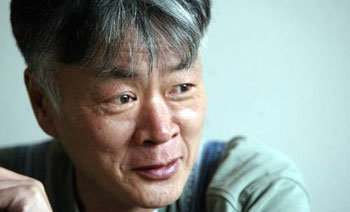Kim Huns Songs

Kim Hun impressed me with his writing from the very beginning. I bought one of his books at a bookstore in the spring of 2001. It was a novel written by the former journalist. His writing style fascinated me and I went on to read a novel titled A Song of a Knife. Since then, I started to collect his writings.
I read every single piece of writing by and about him, underlining as I read them over and over as I went. I read A Song of a Knife 10 times and A Song of a String, a long novel published afterwards, three times.
I know nothing about literature. I just liked novels from writer Lee Mun-yeol before.
If you asked a couple who is in love, Why do you like him or her? they would say, There is no reason for liking someone. If Im asked Why Kim? then, all I can say is, I just like him. Im addicted to him.
Kim Hun is good-looking. His appearance is full and empty, and firm and gentle at the same time. At a glance, he has eyes that push away other people. But if you look at them closer, they are irresistibly attractive.
When you are with him, you will get charmed by him in a moment. His words are like a hammer and a drill. They are vague and clear. It seems that he just spits words without a clear objective, but actually they are hitting the nail on the head. I like his jokes, which are very hilarious, more than anything else.
The body, writings, and life of Kim Hun, who writes for his living, are consistent with each other. That is why he is powerful and attractive. His writings, which do not curry favor with the public, produced a lot of people who dont like him. In a writing, he wrote, I will do away with universality and objectivity, ridicule justice for the masses, and go toward my own partiality and prejudice. Writers enemies are readers in the end. Therefore, writing is just a one against everybody fight. He is fully aware of his fallacies that others point out. However, he says, My sentences come up from my insides. I know the fallacies, but I cannot fix them. I see other paths, but I cannot step on them. I love his fallacies. I believe in the power of labor rather than gifts. Geniuses were all diligent. And their labor was a way of making a living. I dont trust people who think little of bread and money. For human beings, sustaining our lives is most urgent and noble. Everything other than that is just secondary.
Kim Hun knows very well the significance of breadwinning and labor than anyone else. So he wrote, Son, a mans life is not easy. You should be aware of the dread of money and bread. You should not play the baby in front of money and bread. In that sense, he and I are on the same wavelength. However, he warned that a means of living could destroy humans. In an interview, he said If a journalist looks like a journalist, a police detective looks like a police detective and a public prosecutor looks like a public prosecutor, they are all ruined by labor. They can be sound men only when it is hard to tell what they do for a living.
His eye for art is almost like that of a critic.
In his book, About a question about which way, how do you? he wrote about Lee Jung-seop, Gyeomjae Jeongseon (a leading artist in Joseon Dynasty), and Goguryeo mural paintings, and reviewed them in a very subtle way that even an art critic would be proud.
Some people say that Kim Hun is an irresponsible nihilist. His writings contain the vainness of those who saw the truth of the world. However, Im not sure if the adjective irresponsible is appropriate. He talks about the despair of the world, but he is not a nihilist who denies all values. He says, The world is not readable or explainable, but it is a place where we should live.
He wrote in a foreword of A Song of a Knife: I decided to abandon all pity I had for human beings. I thought that only when I threw it away, I could see the world. It was not easy to give up that pity.
He cannot to give up love even though he cries out that love is just about impossibility. The life of Kim Hun, who lives with his own desperate fallacies, is as beautiful as his sentences. I look forward to his next novel.







